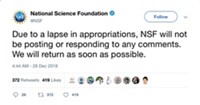Advertisement
Grab your lab coat. Let's get started
Welcome!
Welcome!
Create an account below to get 6 C&EN articles per month, receive newsletters and more - all free.
It seems this is your first time logging in online. Please enter the following information to continue.
As an ACS member you automatically get access to this site. All we need is few more details to create your reading experience.
Not you? Sign in with a different account.
Not you? Sign in with a different account.
ERROR 1
ERROR 1
ERROR 2
ERROR 2
ERROR 2
ERROR 2
ERROR 2
Password and Confirm password must match.
If you have an ACS member number, please enter it here so we can link this account to your membership. (optional)
ERROR 2
ACS values your privacy. By submitting your information, you are gaining access to C&EN and subscribing to our weekly newsletter. We use the information you provide to make your reading experience better, and we will never sell your data to third party members.
Policy
Shutdown Slams Federal R&D
Government: Budget impasse halts work for most government researchers and agencies
by Andrea Widener
October 3, 2013
| A version of this story appeared in
Volume 91, Issue 40
WHO’S WORKING

\
The government shutdown has sidelined a majority of federal employees, including many scientists. Here are a few research-related people still on the job.
◾ Workers in the Office of Polar Programs at NSF
◾ Lab technicians keeping test animals alive at EPA
◾ Environmental management workers at DOE
◾ Nuclear engineering technicians at NIST
◾ Health care workers taking care of patients at NIH Clinical Center
◾ Researchers who investigate adverse event reports at FDA
DOE = Department of Energy.
NIST = National Institute of Standards & Technology.
SOURCE: Agency contingency plans
The federal R&D enterprise nearly ground to a halt last week when Congress failed to pass a 2014 budget. Because there was no budget when the fiscal year started on Oct. 1, the government partially shut down for the first time in 17 years.
Adding to the uncertainty is growing concern about another approaching political showdown over the nation’s debt-ceiling limit, which could further impede government operations.
As C&EN went to press, thousands of scientists were among the 800,000 federal workers who remained at home on furlough as congressional leaders continued to butt heads over a stopgap budget measure to keep the government running. Support for the Affordable Care Act was the main subject of disagreement.
Among chemists, the biggest impact is likely on federal scientists at agencies such as NIH and EPA. Many have had to temporarily abandon their research and may not be paid for missed days resulting from the shutdown.
Chemists in industry and academia are also left in the lurch. Many regulatory agencies have halted inspections, such as FDA’s food safety checks, and processing of applications, such as EPA’s premanufacture notices approving new chemicals.
The Society of Chemical Manufacturers & Affiliates, an industry group, is concerned that the shutdown will halt free-trade negotiations with Europe scheduled for this week, says William E. Allmond IV, vice president of government and public relations. “It puts all of those industry priorities on the back burner.”
The National Science Foundation and other science funders have quit processing new grants, although grantees who have already received funds can spend that money. Scientists with pending grant applications cannot work on them because most government websites are not operating.
George Washington University’s chemistry department chair, Michael M. King, is most worried about junior faculty members who have grants under review. “What’s disappointing is the time and effort that is being devoted to figuring out what to do rather than doing something productive for our teaching and research,” he says.
While talks continue, some agencies are still at work because they run on user fees, including the Patent & Trademark Office and the FDA office that processes New Drug Applications. Although 70% of Department of Energy employees are furloughed, its national laboratories will continue operating on contingency funds, at least for the short-term.
“I ask you to maintain your focus during these uncertain budgetary times,” Los Alamos National Laboratory Director Charles F. McMillan wrote to employees. “Watch out for each other and concentrate on things we can control.”
To read about how the shutdown and eventual restart is affecting chemists, visit http://cenm.ag/woes. To contribute your story, visit http://cenm.ag/govt.





Join the conversation
Contact the reporter
Submit a Letter to the Editor for publication
Engage with us on Twitter